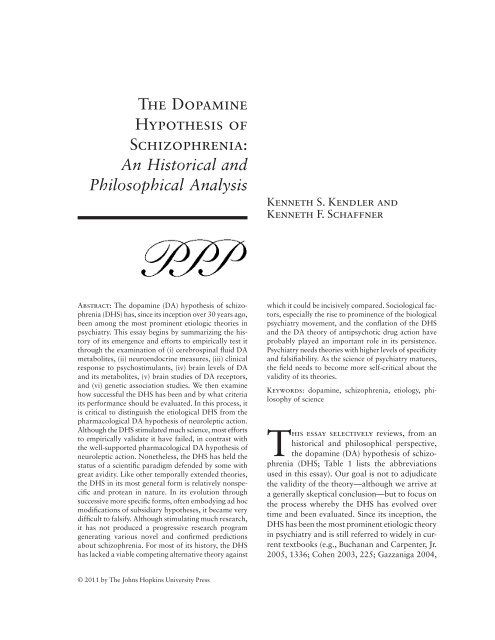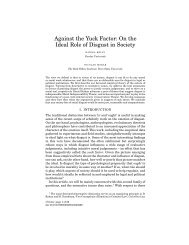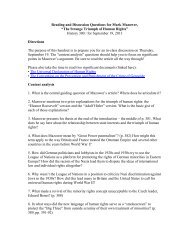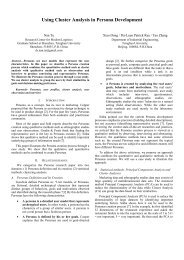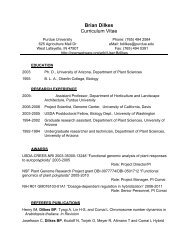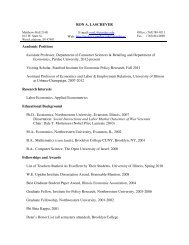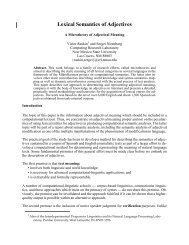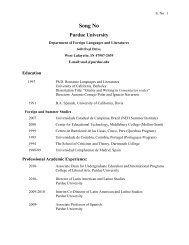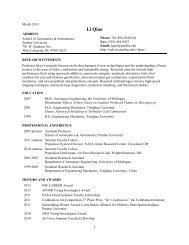The Dopamine Hypothesis of Schizophrenia: An Historical and ...
The Dopamine Hypothesis of Schizophrenia: An Historical and ...
The Dopamine Hypothesis of Schizophrenia: An Historical and ...
Create successful ePaper yourself
Turn your PDF publications into a flip-book with our unique Google optimized e-Paper software.
<strong>The</strong> <strong>Dopamine</strong><br />
<strong>Hypothesis</strong> <strong>of</strong><br />
<strong>Schizophrenia</strong>:<br />
<strong>An</strong> <strong>Historical</strong> <strong>and</strong><br />
Philosophical <strong>An</strong>alysis<br />
Kenneth S. Kendler <strong>and</strong><br />
Kenneth F. Schaffner<br />
Abstract: <strong>The</strong> dopamine (DA) hypothesis <strong>of</strong> schizophrenia<br />
(DHS) has, since its inception over 30 years ago,<br />
been among the most prominent etiologic theories in<br />
psychiatry. This essay begins by summarizing the history<br />
<strong>of</strong> its emergence <strong>and</strong> efforts to empirically test it<br />
through the examination <strong>of</strong> (i) cerebrospinal fluid DA<br />
metabolites, (ii) neuroendocrine measures, (iii) clinical<br />
response to psychostimulants, (iv) brain levels <strong>of</strong> DA<br />
<strong>and</strong> its metabolites, (v) brain studies <strong>of</strong> DA receptors,<br />
<strong>and</strong> (vi) genetic association studies. We then examine<br />
how successful the DHS has been <strong>and</strong> by what criteria<br />
its performance should be evaluated. In this process, it<br />
is critical to distinguish the etiological DHS from the<br />
pharmacological DA hypothesis <strong>of</strong> neuroleptic action.<br />
Although the DHS stimulated much science, most efforts<br />
to empirically validate it have failed, in contrast with<br />
the well-supported pharmacological DA hypothesis <strong>of</strong><br />
neuroleptic action. Nonetheless, the DHS has held the<br />
status <strong>of</strong> a scientific paradigm defended by some with<br />
great avidity. Like other temporally extended theories,<br />
the DHS in its most general form is relatively nonspecific<br />
<strong>and</strong> protean in nature. In its evolution through<br />
successive more specific forms, <strong>of</strong>ten embodying ad hoc<br />
modifications <strong>of</strong> subsidiary hypotheses, it became very<br />
difficult to falsify. Although stimulating much research,<br />
it has not produced a progressive research program<br />
generating various novel <strong>and</strong> confirmed predictions<br />
about schizophrenia. For most <strong>of</strong> its history, the DHS<br />
has lacked a viable competing alternative theory against<br />
which it could be incisively compared. Sociological factors,<br />
especially the rise to prominence <strong>of</strong> the biological<br />
psychiatry movement, <strong>and</strong> the conflation <strong>of</strong> the DHS<br />
<strong>and</strong> the DA theory <strong>of</strong> antipsychotic drug action have<br />
probably played an important role in its persistence.<br />
Psychiatry needs theories with higher levels <strong>of</strong> specificity<br />
<strong>and</strong> falsifiability. As the science <strong>of</strong> psychiatry matures,<br />
the field needs to become more self-critical about the<br />
validity <strong>of</strong> its theories.<br />
Keywords: dopamine, schizophrenia, etiology, philosophy<br />
<strong>of</strong> science<br />
This essay selectively reviews, from an<br />
historical <strong>and</strong> philosophical perspective,<br />
the dopamine (DA) hypothesis <strong>of</strong> schizophrenia<br />
(DHS; Table 1 lists the abbreviations<br />
used in this essay). Our goal is not to adjudicate<br />
the validity <strong>of</strong> the theory—although we arrive at<br />
a generally skeptical conclusion—but to focus on<br />
the process whereby the DHS has evolved over<br />
time <strong>and</strong> been evaluated. Since its inception, the<br />
DHS has been the most prominent etiologic theory<br />
in psychiatry <strong>and</strong> is still referred to widely in current<br />
textbooks (e.g., Buchanan <strong>and</strong> Carpenter, Jr.<br />
2005, 1336; Cohen 2003, 225; Gazzaniga 2004,<br />
© 2011 by <strong>The</strong> Johns Hopkins University Press


